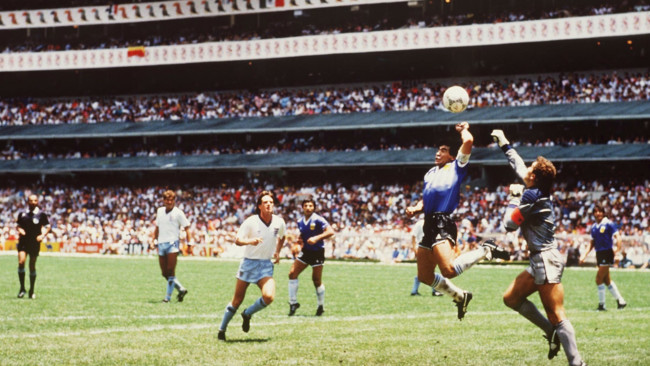The joy of cheating
We love cheating, referee errors, good goals disallowed and bad goals that were. A Manchester United player was just offside for their first goal against Arsenal last week. The officials missed it. Arsenal’s first goal crossed the United goal line by the width of a cigarette paper. Again the referee missed it. But the robots didn’t. Goal given. Last night West Bromwich Albion cheated in their 2-2 draw with Aston Villa. “Jay Rodriguez just threw himself at the cross,” Baggies head coach Darren Moore told BBC Sport. “He admits that it did hit his arm but he didn’t know much about it. And you’ve got to admire his honesty.”
How can you not admire the footballer who scores with his hand? Not the part about his being honest. That’s guff. Cheating is cheating. We should admire Rodriguez because he pushed the rules to the limit, found them wanting and in so doing created emotion and a story from a small moment in a distracting leisure activity. Isn’t football great.
Well, enjoy it while it lasts. VAR is an abomination. Football is fast. Mistakes happen. Fans and players feel feted or hard done by. The joy surges. The antagonism builds.
At another recent Arsenal match, this time against Spurs, the Tottenham striker Son dived to win a penalty. No VAR was used. Arsenal felt aggrieved. The home fans seethed. The visitors taunted. The stadium throbbed like Terry Waite’s bladder. It was great. What a show. This was the theatre of football. It’s not an insurance seminar on risk reduction.
So congratulations to Rodriguez, Son and all the players and refs who keep the game human. Don’t let the robots in. They’ll kill it.
PS: If football is to become an extension of the classroom, will that stop cheating? Nope. James M. Lang argues that place and time can trigger cheating:
[C]heating levels are fairly high, but they have always been so. The better question to ask is why. Duke University researcher Dan Ariely and his colleagues have conducted dozens of experiments designed to see what makes people willing to engage in acts of cheating and dishonesty in their everyday lives. Their findings have been remarkably consistent: most people, under the right circumstances, are willing to engage in small acts of dishonesty. This seems to be a part of our human nature. With enough incentives in front of us, most of will cheat at least a little bit.
Cheating is natural. The temptation to cheat is human:
As it turns out, almost anyone will cheat when given even minor, consciously imperceptible behavioral cues. For instance, in a series of three experiments, a group of psychologists found that lighting could affect cheating. In one study, participants in a dimly-lit room cheated more often than those in a lighter one. While both groups performed equally well on a set of math problems, students in the darker room self-reported that they correctly solved, on average, four more problems than the other group—earning $1.85 more as a result, since they were being paid for each correct answer. The authors suggested that the darkness created an “illusory anonymity”: even though you aren’t actually more anonymous in the dark than in the light, you feel as though you are, making you more likely to engage in behaviors you otherwise wouldn’t. Similar effects have been observed with a variety of situational factors that don’t seem directly related to cheating. We cheat more, for instance, when we’re in a messy environment—one that has more signs of socially deviant behavior, like litter, graffiti, and other rubble.
And then – and then – you think of the spirit and what happens next. What reputation do you want? Matthew Syed cites a sporting great:
In the World Cup semi-final between Australia and Sri Lanka at St George’s Park in 2003, the Aussies were on 34 after five overs when Aravinda de Silva was brought on to bowl. On his second delivery, Adam Gilchrist stepped forward to sweep, edged the ball on to his front pad, and watched it sail into the hands of Kumar Sangakkara, the wicketkeeper. The Sri Lankans made a sustained appeal. Rudi Koertzen, the umpire, shook his head. “Not out,” he said.
In True Colours, his wonderful autobiography, Gilchrist would later recall that he felt “strange” at that moment, perhaps a little confused. “So much discontent about umpiring, video decisions, and trust between players had been bubbling away,” he said. He then heard an emphatic voice in his head. “Go,” the voice said. “Walk”. As he made his way towards the pavilion, something odd happened. The Port Elizabeth crowd started cheering. They knew that he had made a gesture more important than mere winning and losing.
We love the cheats. And we love the heroes. The best bit is that in the rough and tumble of sport, in the complexity and contradiction of what it is to be human, you can be both. And there’s always the drugs…
Posted: 8th, December 2018 | In: Arsenal, manchester united, News, Sports, Spurs, Technology Comment | TrackBack | Permalink



